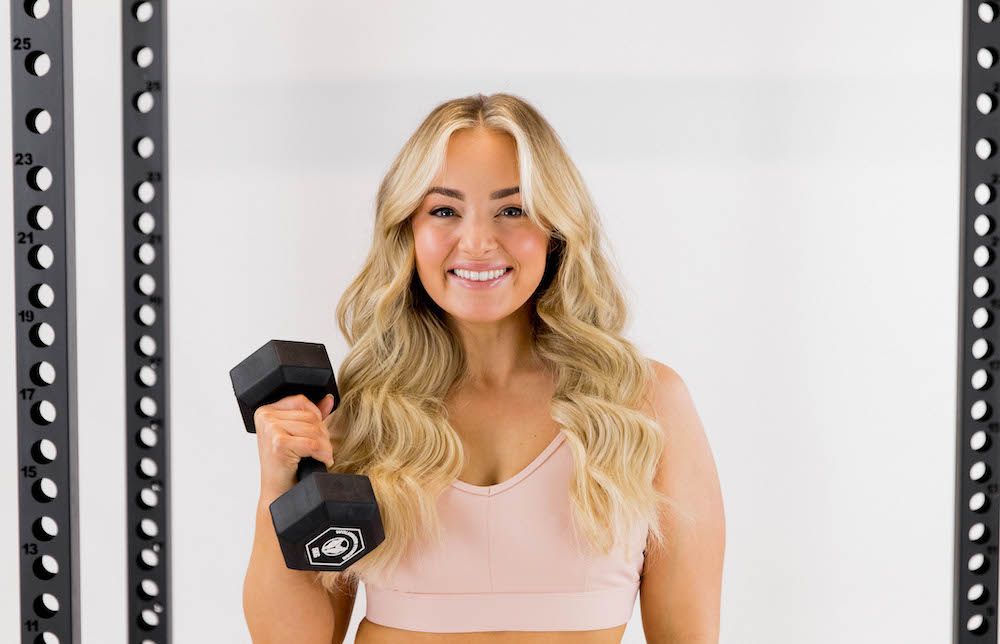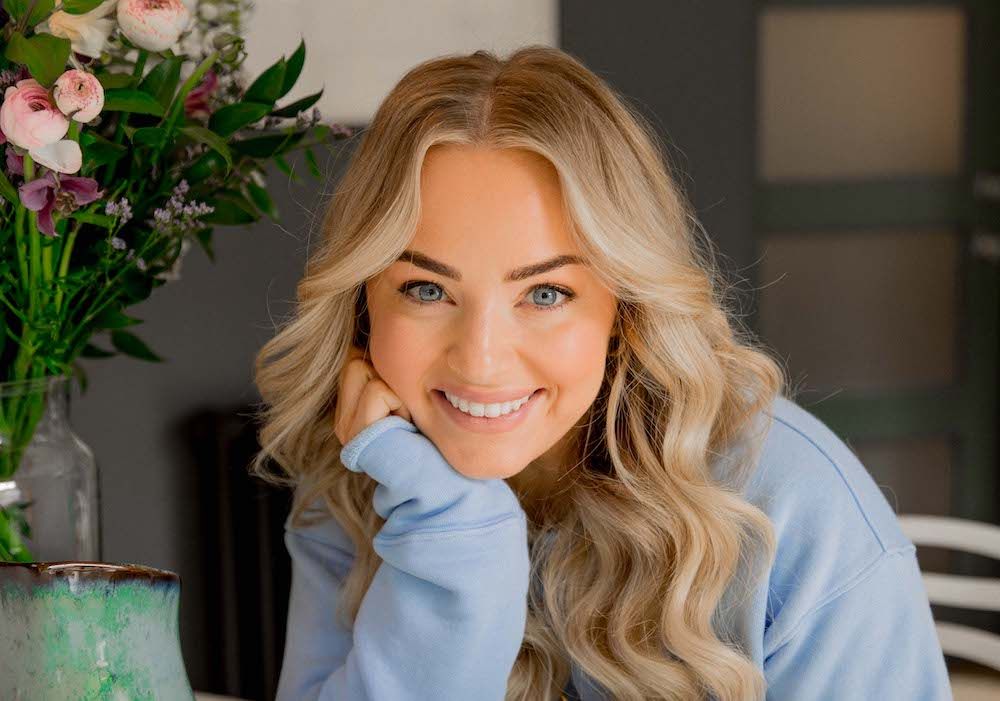Redefining your approach to exercise with Alice Liveing
updated on Jul 5, 2021
Alice Liveing is the fitness superstar, best-selling author, and founder of brand new wellness app Give Me Strength, redefining our approach to exercise and sharing, with raw honesty, how she’s ‘doing the work’ with therapy to boost her resilience
"Being outside in nature was so good for my mood,” a fresh-faced Alice Liveing says, describing this morning’s dawn walk. “It’s important to check-in with your body, and know when you can push and pull.”
Leaping out of bed at 6am is inspiring, but for Alice, today’s walk is life in the slower lane. “Five or six years ago” the 28-year-old recalls waking at 5am to be in the gym, before racing around London all day training clients. Exercise was a strict six-days-a-week priority, and the cocktail of commitments left her frazzled.
“I completely overrode any signals of tiredness or hunger. Now, I have a really good level of intuitiveness,” she explains. “I have a much healthier balance. I have a respect for my body, for rest, and know that exercise isn’t always a good thing. Sometimes the best thing you can do is do nothing, and that’s OK.”
Mindful of the restorative benefits of rest, and the impact various factors such as hormones, insufficient sleep, and stress on energy levels, recently in the midst of “the most awful period”, Alice abandoned exercise plans in favour of “vegging on the sofa”.
Photography | Lydia Collins
While this visceral approach to health is refreshing, Alice is equally conscious of the dangers of inactivity. A 2017 study by the British Heart Foundation said “around 20 million adults in the UK are insufficiently active”, and she believes we need to celebrate a greater variety of role models, to encourage more people to take their health seriously.
“We have to start championing a diverse range of voices in order for people who live all over the country, who might have never engaged with exercise before, to see someone on a bus or in a magazine be like, ‘She looks like me. I can do that,’” she says.
“We don’t celebrate female athletes enough. Why aren’t we seeing female rugby players, shot putters, weight lifters? Fit looks different on everyone, and healthy looks different on everyone. We need to diversify who we’re seeing as our role models within that fitness space. You can’t be what you can’t see.”
And Alice has come a long way in her own journey to try to be that role model for others. When the former musical theatre student from Buckinghamshire burst on to the scene in 2015, she was a student-turned-food-blogger who quickly built a vast social media following under the moniker Clean Eating Alice. But by the summer of 2019, after banking a raft of celebrity clients and outselling the likes of Mary Berry and Jamie Oliver with the first of three best-selling books, the qualified PT and nutritionist admitted that at the height of her rise to fame, she fell victim to societal pressures and body image hang ups, which led to a propensity to over-exercise. She later conceded that her original approach had been a little “restrictive”, but says that learning from those mistakes helped her realise the power of inclusive, instinctive fitness.
“My journey was played out incredibly publicly, and it was painful at times to have to regress on some of the stuff I’d said. But do I regret it? In some ways, no, because so many women who follow my page now see that journey in themselves,” says Alice honestly, whose motto is now “everything in moderation”.
Today, honesty still reigns as Alice reveals how, during the pandemic, she found herself struggling with her mental health, and sought counselling to better understand herself.
“This time last year, I was in such a bad place,” she says. “Up until lockdown, I’d lived my life at a million miles an hour, and I had filled voids of emptiness and sadness with keeping myself busy. The stillness of lockdown and everything being ripped out from underneath us all made me really think, ‘There’s a lot that I need to connect with here, and I need to deal with.’”
A survivor of domestic abuse, Alice was just 16 when a new boyfriend became controlling, and abused her physically and mentally over the course of a year.
“It really messed me up. It messed up my ability to have relationships, and my ability to trust. I’m incredibly nervous in certain situations – I still have times where I have really bad flashbacks. A lot of stuff still haunts me,” says Alice, explaining how she first found it easier to “bury my head in the sand and pretend it never happened”, before eventually turning to counselling.
"I’m not a superwoman. We all can be hurt, we all go through things that are going to damage us. My biggest message is do the work and take the help, because that’s what will make you resilient"
The self-help was short-lived though, as Alice elected to “walk away” from talking therapy when she and the therapist failed to click. Then last year, at the start of the pandemic, Alice found an “amazing” therapist online, and finally began healing past trauma through bi-weekly sessions.
“In the past, therapy almost felt like a tick box exercise. I’d sit there, tell them all my problems, then leave and feel terrible,” says Alice. “What I really learned was I needed to find someone that I really gelled with, had a relationship with, and [with whom] there was a level of trust, and communication. Ten years later, I’m ready to talk about it.”
And how is she feeling now, following that period of support and therapy?
“There’s work to be done in terms of healing a lot of that trauma, but I would say I’m 99% there. There are moments where I see someone that looks like him, or I’m walking down my road, when it’s dark, and I suddenly think, ‘Oh my god, what would I do if he was behind me?’ I never feel 100% safe, but you can heal it. It takes time.”
Ask Alice – now a Women’s Aid ambassador and happily in a relationship with her boyfriend, Paddy – to pinpoint the most incredible thing she has learned about herself during one year of consistent, regular therapy, and she contemplates for a moment.
“What abuse does, is it makes you feel so worthless that you think nobody will love me or care about me,” Alice says. “My confidence was so shredded, and that’s why I was constantly trying to fill that void by projecting this image of happiness. All that stuff is just a sticking plaster for a deeper issue, and I have learned that I need to like myself from the inside out first, and the only way that we can start to have a better relationship with everyone around us, is to have a better relationship with ourselves.”
It makes total sense that Alice called her new app Give Me Strength – the same name as her hugely successful podcast, which sees her interviewing extraordinary people about building mental and physical resilience. Alice is a prime example of someone who’s discovered durability during dark times. She links her resilience to her parents, who she says are “very strong people”, but believes her true power comes from not being afraid to invest in self-improvement.
Photography | Lydia Collins
“My life is a million times better now than it ever has been, but I’m also doing the work,” she says. “I’m not a superwoman. We all can be hurt, we have all experienced trauma, we all go through things that are going to damage us. My biggest message is do the work and take the help, because that’s what will make you resilient.”
Since the pandemic, Alice has observed a shift in the fitness landscape, as more people turn to exercise, not just to reap fitness benefits. The closure of gyms sparked a surge in home workouts, which provided an energy release, and a much-needed sense of community during isolation.
“The last year has made people call upon exercise for different motivations. People recognised that they needed it to support their mental wellbeing,” says Alice. “We are very lucky we’re in a time when talking about mental health is far less taboo, which means that people can speak about relying on exercise to help with their anxiety or their depression.”
These days, Alice has become a virtual trainer to the masses, having shifted her entire brand online. During lockdown, she provided daily live workouts over Instagram. Now the app is taking her services to the next level.
“I hated only being able to see 10 clients in a week. Now I can be everyone’s pocket personal trainer in the app,” she smiles. “It’s very much about what I can give to you, how I can educate you, and help you to have a positive environment in which you can develop a healthy relationship with exercise.”
Alice swears by a multifaceted approach to physical wellbeing, because a combination of factors create our personal optimal health. But her best bit of advice?
“The one thing everyone can do for free today to feel better is to walk more,” she says. “We are becoming a much more sedentary nation, and walking is incredible for our mind and body. Walk a little more, really enjoy that time and, if possible, make that walk in nature to make it even better.”
Hero image: Photography | Lydia Collins
To connect with a counsellor to discuss feelings of low confidence, visit counselling-directory.org.uk



